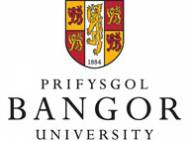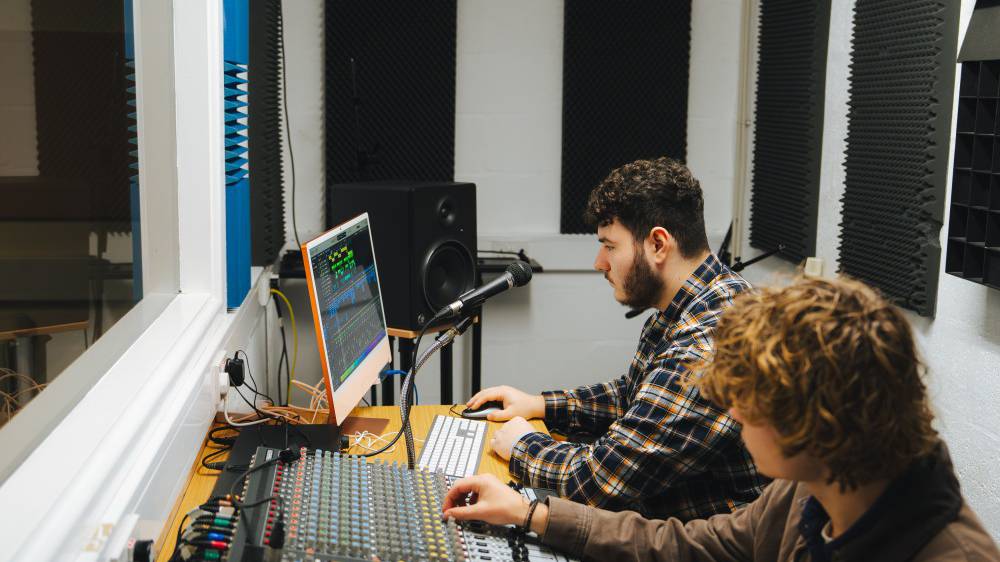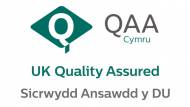Foundation Degree (FdA) Media Production & Technologies
Key Details
- Available at:Rhos-on-Sea
- Study Mode:Part-time, Full-time
- Course Length:
Full-time: 2 years OR Part-time: 4 years.
Monday & Tuesday, 9am-5pm
- UCAS Codes:WP64
Foundation Degree (FdA) Media Production & TechnologiesUniversity-level Courses
Part Time
If you are applying to study part-time you can apply directly to the campus of your choice.
Full Time
There are two ways to apply to study for a full-time higher education course - either through UCAS or directly to the college.
Applying through UCAS:
You should apply through UCAS if you are currently studying for A Levels, a vocational Level 3 course (i.e. BTEC) or an Access to Higher Education qualification, or if you wish to apply to more than one higher education provider.
There are two ways to apply to study for a full-time higher education course - either through UCAS or directly to the college.
Course Description
The course is designed to equip students with the creative, technical, and professional skills required to excel in the dynamic and competitive media industries. This comprehensive course bridges the art of storytelling with cutting-edge technology, fostering innovation and critical thinking in key areas of media production. The course offers a unique blend of creative freedom, technical mastery, and entrepreneurial insight, empowering students to thrive in the media industry's ever-changing landscape.
Year 1 (Level 4)
- Contextual Studies
- Employability Based Learning 1
- Essential Technical Skills
- Introduction to Audio Editing & Production
- Introduction to Video Editing
- Multi-Camera Production
- Video Project
Year 2 (Level 5)
- Audio Technologies & Sound Design
- Digital & Graphic Design
- Employability Based Learning 2
- Journalism & Cultural Studies
- Major Project
- Media Industry Research Project
Additional information
More detailed information on modules is to be found in the ‘Additional Campus/Course Information’ section.
Entry Criteria
Language requirements:
- GCSE in Welsh or English as first language, grade C/4 or above
- Any degrees, diplomas or certificates eligible should have been taught and assessed in Welsh or English, or
- For overseas applicants, for entry onto Level 4, English fluency to IELTS 5.5 or higher (with no element less than 5.0)
- For overseas applicants, for entry onto Levels 5 or above, English fluency to IELTS 6.0 or higher (with no element less than 5.5)
Academic requirements:
- a minimum of 70 UCAS tariff points in a main level 3 qualification, usually gaining a pass in at least one relevant subject which could include: A Levels, BTEC, International Baccalaureate, ACCESS to HE; or NVQ Level 3; many additional qualifications from Wales, England and Scotland are accepted to support the UCAS points in addition to the relevant subject, such as the Welsh Baccalaureate.
- GCSE Mathematics/Numeracy, grade C/4 or above, or Key/Essential Skill equivalent level. For applicants without these qualifications, evidence of numeracy skills at a suitable level to meet the demands of the programme successfully, will need to be demonstrated.
- Equivalent international qualifications are acceptable
- Portfolio to be an option as a supplement
For individuals who do not meet the above academic requirements we will consider a wide range of non-standard or professional qualifications and experience, through the submission of a portfolio for accreditation of prior learning (APL/APEL/RPEL), in accordance with GLlM regulations and policies.
All places are subject to a satisfactory interview.
If your qualifications do not meet the entry requirements listed above, we would still encourage you to apply for the course you're interested in, as many of our courses will consider learners based on their previous work and skills experience rather than their qualifications.
Delivery
The course is delivered through a blend of the following:
- Presentations
- Group work
- Practical sessions
- Seminars
- Lectures
- Video essays
Learning is participative, informal and full of opportunities for individual exploration and creativity. Industrial placement may also form part of the course.
Students are responsible for organising their own work experience if it is a requirement on their programme, and they will be supported by the course team.
Timetable
- Full-time: 2 years, 2 days per week (typically 9.00 am – 5.00 pm)
- Part-time: 4 years, 1 day per week (typically 9.00 am – 5.00 pm)
Fees
Visit our course fees page for information on full and part-time degree course fees.
Financial Support
Visit our financial support page for information on the range of support available.
More detailed information on other costs associated with your course and work placements/work experience (if applicable) will be outlined in the programme validation document and explained to you at your interview.
Additional Costs
Additional costs may be associated with the following:
- materials for independent study
- external visits such as to museums or exhibitions
- software to be able to work from home
- access to materials for evaluation and analysis
Start date
September
Contact:
For specific course enquiries, please contact:
James Lehart (Programme Leader): lehart1j@gllm.ac.uk
David Clarke (Administration): clarke1d@gllm.ac.uk
For general enquiries about our degrees, please contact: degrees@gllm.ac.uk
Assessment
The course is assessed through coursework. There are no examinations.
Feedback
Where relevant, assessments will be marked and returned to students with constructive and developmental feedback. Effective feedback combines information which enables students to understand the strengths and limitations of their past performance, and information which enables them to recognise how future performance can be improved. Students will be provided with feedback in a timely manner and this feedback will justify how the grade has been awarded. Students will have the opportunity to reflect on the feedback given and identify their strengths, things they found challenging and areas for development that they will feed forward to their next assessment. Feedback will include linking evidence to assessment criteria to demonstrate how the student will have met the learning outcomes.
Progression
Students can progress onto the BA (Hons) Creative and Broadcast Media.
Campus Information Rhos-on-Sea
Unit information
For every 10 credits, students should engage with around 100 notional hours of learning. This will be approximately 30% direct learning contact and 70% independent student learning.
The course consists of the following modules:
Year 1 (Level 4)
Contextual Studies
This module is aimed at introducing students to key media theories and their relevance to the study and production of media. This module also embeds foundational academic skills, including research, referencing, and academic writing, preparing students for further study and professional practice.
Employability Based Learning 1
This module aims to enhance students' employability by developing their creative and technical skills through real-world video production projects for local businesses. It provides students with the opportunity to collaborate with industry partners, apply video production techniques, and reflect on their professional growth. Students will gain practical experience while building a portfolio of work to showcase to potential employers
Essential Technical Skills
This module equips students with the essential technical skills required for professional media production and event management. It focuses on practical application, developing proficiency in lighting, sound, and camera operation. It also develops an understanding of workplace ethics, communication, and collaboration, enabling students to produce high-quality media content and live events.
Introduction to Audio Editing & Production
This module aims to provide students with a foundational knowledge of practice and skills in audio production and editing. Through theoretical exploration and hands-on practice, students will learn key concepts in audio theory, recording, mixing, and post-production. Students will develop technical competence using Digital Audio Workstations (DAWs) and sound equipment, and critically reflect on their production processes.
Introduction to Video Editing
This module aims to develop students’ understanding of the editing process and how it is applied within the media industry.
Multi-Camera Production
This module will enable the student to develop knowledge and skills in multi-camera operations and productions, to work to plan and produce a multi-camera production to a specified brief. This module will cover practical aspects of a studio-based production, developing on the knowledge and understanding of various video and AV-IP based protocols, industry terminology and practices.
Video Project
This module aims to provide students with the opportunity to conceptualise, plan, develop, and execute a video project, through the integration of storytelling, technical execution, and creative production processes. Students will develop a comprehensive understanding of pre-production, production, and post-production workflows, enabling them to create a professional product.
Year 2 (Level 5)
Audio Technologies & Sound Design
This module aims to deepen students’ understanding of advanced audio technologies and sound design practices, building on foundational audio production knowledge. Students will explore creative and technical techniques for sound manipulation, immersive audio design, and advanced post-production workflows. The module will focus on the role of sound in various contexts, such as film, television, games, music, and immersive media.
Digital & Graphic Design
This module introduces students to the principles and practices of digital and graphic design, emphasising design as a tool for clear and impactful communication. Students will develop skills in creative software, typography, and branding, applying industry-standard tools and theoretical frameworks to create engaging visual solutions that support effective communication across digital and print media.
Employability Based Learning 2
This module is intended to allow students to gain skills and develop frameworks to reflect critically on learning and work-based experiences. Through the undertaking and documentation of a work placement, students will enhance their employability through the development of vocationally relevant skills and self-awareness.
Major Project
This module enables students to draw on their academic, technical, and creative experiences to deliver a significant, self-directed media project. Through collaborative and independent work, students will develop and demonstrate expertise in their chosen specialism whilst enhancing professional skills in project management, collaboration, and industry engagement. This module will prepare students for higher-level study or entry into the media industry, with a focus on delivering a project that aligns with professional standards and showcases their individual and collective capabilities.
Journalism & Cultural Studies
This module aims to explore the intersection between journalism and cultural studies, examining the historical evolution of journalism, its role in shaping public discourse, and its relationship with cultural production. Undertaking a study of the changing landscape of journalism, students will develop analytical and reflective skills essential for understanding contemporary media practices.
Media Industry Research Project
This module aims to create a platform for students to investigate and refine a particular skill within the creative media field. Students are expected to identify, explore, and complete a creative media related project that will support them in their future endeavours.
Other details
Course type: University-level Courses
Level:
4+5
Programme Area:
- Media, TV and Film
Awarding Body: Bangor University
Awarding Body



